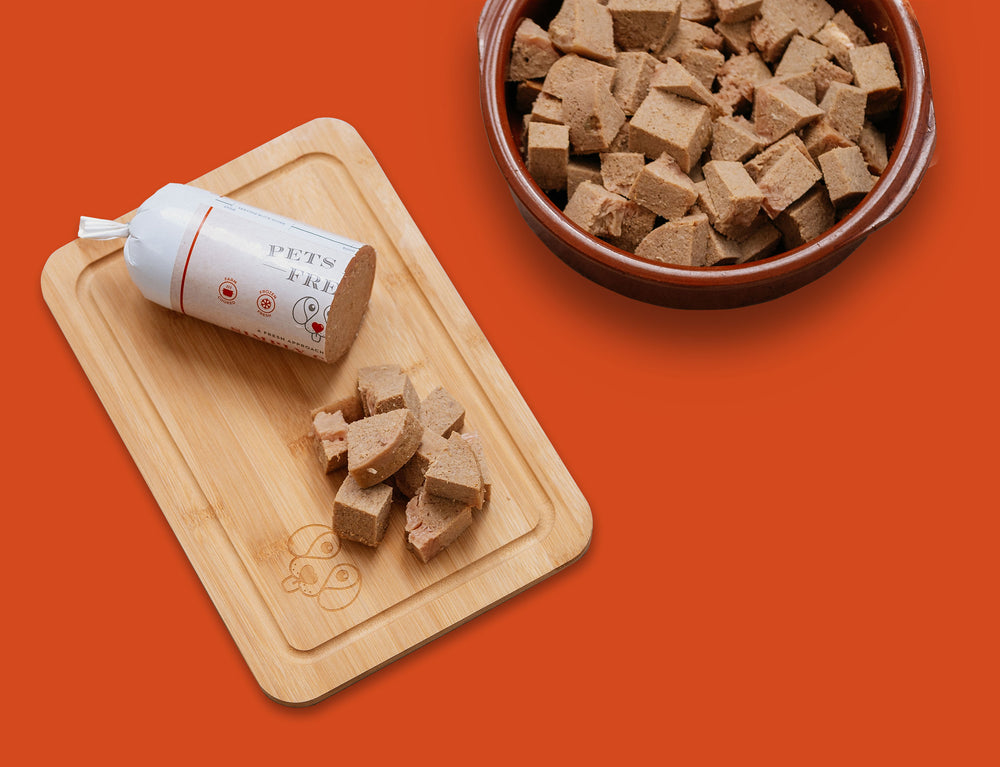As pet owners, we all want our furry friends to be comfortable and healthy, and it can be distressing to see them constantly scratching or chewing at their skin. Itchy skin in dogs can be caused by a wide range of factors such as allergies, parasites, infections and dietary sensitivities.
This article takes a look at canine skin health, exploring the various causes of itchy skin, how to soothe the symptoms with home remedies, preventative measures as well as how to treat the problem.
Why Is My Dog's Skin Itchy?
All dogs can get a little itchy sometimes, but if your pup seems to be scratching quite a lot, you might assume that it's fleas. If you can’t see any sign of the blighters, and if you’ve been giving your pet their regular flea treatments, then it’s likely to be something else, such as food and contact allergies.
But before looking at the main causes of itchy dog skin, how best to treat it, and how to reduce the likelihood of it returning again (and again, and again…), let’s take a glance at the other symptoms to look out for.
What Are the Other Symptoms of Itchy Dog Skin?
Note: if you notice any of these symptoms in your dog, please consult a veterinarian immediately.
Illnesses that lead to itching, also known by the official name of pruritus, typically also cause other symptoms. When you take your dog to the vet, they will usually examine your dog by gently parting the fur where they are scratching the most to see if the skin is red, inflamed and crusty. They will also look for any discharge from the skin.
Other symptoms that sometimes appear at the same time as itchy dog skin could be lack of appetite, restlessness and fur loss. Be sure to mention these to your vet if you’ve noticed them at home.
What Are The Main Causes Of Itchy Skin In Dogs?
It’s important to remember that skin conditions aren’t always a quick and simple fix. Diagnosing what’s causing your dog discomfort can take a long time, and you may never get a definitive answer.
Despite this, there are a few common causes your vet will investigate:
Fleas, Ticks, Worms, and Mites
These pests can all cause unwanted itchiness for your dog. For example, when fleas bite, their saliva has specific proteins that can cause an allergic reaction in many dogs. Keeping up a consistent prevention and treatment routine will minimise the risk of these little creatures appearing.
For fleas and mites, there are many products available including topical treatments, oral medications, collars and shampoos.
You should consult your veterinarian for the best option for your pet. As well as using one of these treatments on your dog, you should also treat your home by washing all bedding, vacuuming your house and deep cleaning your dog’s environment.
If your dog has ticks, there are also many preventative products available such as topical treatments and tick collars. We’d recommend that you check your dog regularly for ticks, especially after walks in the woods or grassy fields.
If your dog has a tick, then use a tick removal tool or pair of tweezers to remove it. Hold the tick as close to the skin as possible and gently pull it out without twisting and dispose of it. After removal, clean the area with rubbing alcohol or soap and water.
Your vet will advise you on the appropriate deworming medication for your dog if worms are the cause of your dog's itchy skin. You should also be regularly deworming your dog in order to prevent future infestations.
Contact Allergies
These allergies often result from pollen, mould spores and dust mites - many of the same substances that cause allergies in humans. Your vet can often prescribe medicine to help with this.
Food Allergies
These allergies are the hidden source of many undiagnosed itchy skin issues in dogs.
We typically assume that dogs will - and can - eat anything, but this isn’t the case. They have sensitive stomachs, and even if a dog has eaten the same food all its life, it can suddenly develop an allergy to it.
At Pets Love Fresh, our human-grade, high-quality ingredients avoid unnatural preservatives and fillers, reducing the likelihood of common allergies emerging.
How To Soothe Itchy Dog Skin
If you’re looking to provide some quick relief to your dog before tackling any of the main causes listed above, there are plenty of things you can do to soothe your dog's itchy skin.
You can try bathing your dog in cool water before they usually settle down for bedtime. The cool water will reduce the itchiness throughout the night, letting your friend get a good night’s sleep. Deep sleep is when hormones boost the immune system and damaged cells are repaired, which is vital for any unwell animal.
Some people even recommend using a humidifier to hydrate dry and irritated skin.
Home Remedies for Itchy Dog Skin
Itchy skin can leave your dog feeling uncomfortable and irritated, luckily there are some home remedies that can help to soothe their skin.
It’s important to note that if you are concerned about your pet’s health then you should consult your vet and get to the root of the problem.
In the meantime, there are a few things you can do to provide your pet with temporary relief and lessen their scratching.
Oatmeal Bath
Oatmeal baths can reduce inflammation and help wash away allergens in your dog’s fur. Blend plain, unflavoured oatmeal into a fine powder, and then mix it with warm water before soaking your dog in the mixture for about 10-15 minutes. Make sure to avoid getting the solution into your dog’s eyes and ears.
Apple Cider Vinegar
Apple cider vinegar can be effective at treating mild yeast infections on the skin. Mix equal parts apple cider vinegar and water in a spray bottle and spray the mixture onto your dog's itchy areas.
Make sure to avoid open wounds or cuts and don’t let them drink it as it can damage the enamel on their teeth.
Coconut Oil
Coconut oil has antibacterial and anti-inflammatory properties that can help soothe your dog’s irritated skin. Apply extra-virgin coconut oil by gently rubbing it onto your dog's itchy spots.
Aloe Vera
Aloe vera is another natural remedy that can help to cool and soothe itchy skin. Apply a gel that is 100% aloe vera and is free of additives to your dog's itchy areas.
Epsom Salt Soak
If your dog is itching specific areas of their skin, an Epsom salt soak could help. Prepare a warm Epsom salt solution and soak the affected area for 5-10 minutes. Avoid letting your dog drink the solution.
Chamomile or Herbal Tea Soaks
Chamomile, calendula and green tea have anti-inflammatory effects and can be used to cool irritated skin in both humans and dogs. Fill your tub (or sink) with lukewarm water and let several tea bags steep for 3 minutes before soaking your dog in the mixture for around 5 minutes. If your dog has localised itching, you can brew a cup of herbal tea and, after it has cooled down, pour it onto the affected area.
How to Prevent Itchy Dog Skin
Regular brushing and grooming is a good way to remove dead hair and distribute the natural oils in your dog’s fur, helping to prevent itching and allowing you to catch any skin problems early on. Regular check-ups with the vet will also help you to spot any problems and sticking to a deworming schedule will prevent itching caused by worms. You should also keep your dog’s environment clean and tidy to minimise the risk of infestations and allergies.
What to Feed Dogs with Itchy Skin
Ensuring that your dog is eating a balanced diet with high-quality ingredients will support the health of their skin and coat.
If you have ruled out fleas or external allergies, the food that your dog is eating could be contributing to their itchy skin.
Many commercial tinned and kibble dog food contain processed ingredients and can change recipes depending on the availability of ingredients. This could mean you are feeding your dog something that they are allergic to without knowing it.
Cheap kibbles also tend to use excessive carbohydrates and cheap fillers that contribute to allergies. In contrast, feeding your dog fresh dog food could help to improve the health of your dog with allergies.
How Pets Love Fresh Dog Food Can Help With Allergy-induced Itchy Skin
If your dog’s itchy skin is caused by a food allergy you’ll need to keep up a consistent feeding routine to help prevent your dog’s itchy skin from coming back.
The saying, "You are what you eat", doesn't only apply to humans. Wild dogs eat all of their prey - including their stomachs, which would typically contain lots of greens, such as grass and plants. Without this natural mixture of food groups, dogs are more prone to diseases, allergies and the itchy skin that comes with it.
Matching this natural balance of carbohydrates, fats, proteins, vitamins, and minerals can be difficult to do yourself.
Dogs need just as much good, high-quality, nutritional food as us. Usually, it’s hard to find kibble and tinned food on supermarket shelves that provide this. Compared to the food at Pets Love Fresh, these products are often cooked at high temperatures that reduce the nutritional value inside.
The fresh dog food at Pets Love Fresh is the perfectly balanced and vet-approved food your dog needs to stop itching and start thriving.
Skin conditions sadly don’t disappear overnight or with one meal. But feeding your dog a fresh, natural and nutritionally balanced diet by Pets Love Fresh can make a big difference. Try one of our Pets Love Fresh adult dog taster packs or puppy taster packs.



